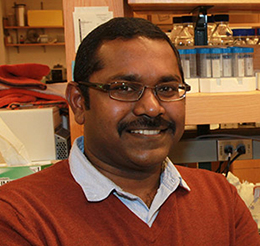SrinivasVinod Saladi
Mass Eye and Ear Infirmary/Harvard Med School & Broad Institute of MIT and Harvard
- 25
2W Rm 220
Boston, MA 02114
United States
Map It
My lab focuses on delineating the mechanisms by which deregulated epigenetic factors contribute to cancer. It is important to have a detailed understanding of the deregulated cancer-associated transcription and epigenetic machinery to treat cancer. TCGA analysis has revealed multiple epigenetic cofactors as amplified or mutated in SCC. My own work has revealed novel epigenetic factor, ACTL6A and RUVBL1, are amplified in HNSCC, contributing to regenerative proliferation ( Cancer Cell, 2017, Oral Oncology, 2020). These factors are catalytic or key components of chromatin remodeling complexes and histone modifying enzymes. The gain and loss of functions of multiple epigenetic factors identified through genomic analysis and their contribution to tumorigenesis needs to be understood to develop targeted therapy in cancer. One of the major aims of the lab is to dissect the mechanisms by which these complex epigenetic and transcription factors drive tumor specific epigenetic plasticity in Squamous Cell Carcinoma (SCC).
In summary, my lab integrates genomics, epigenetics, and signaling to dissect the mechanisms contributing to head and neck cancer maintenance and progression.

